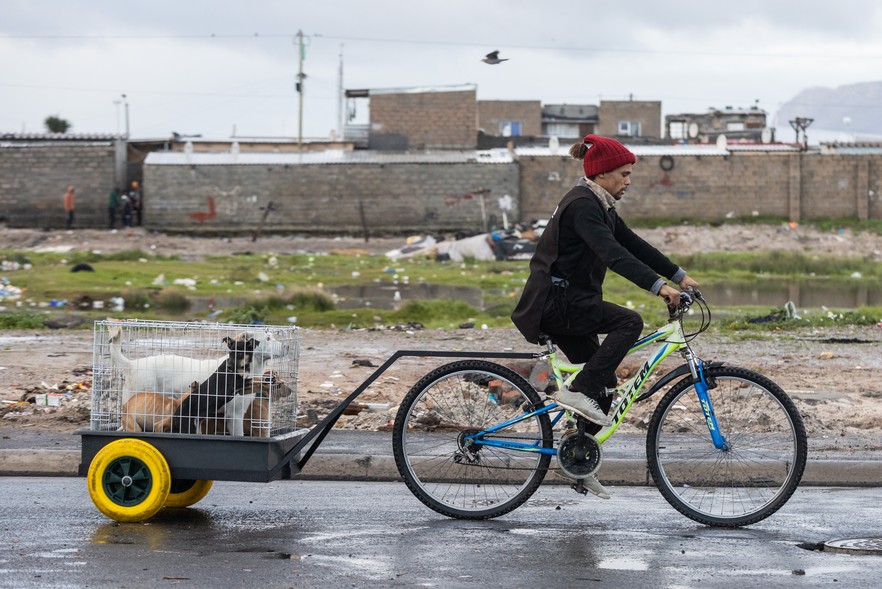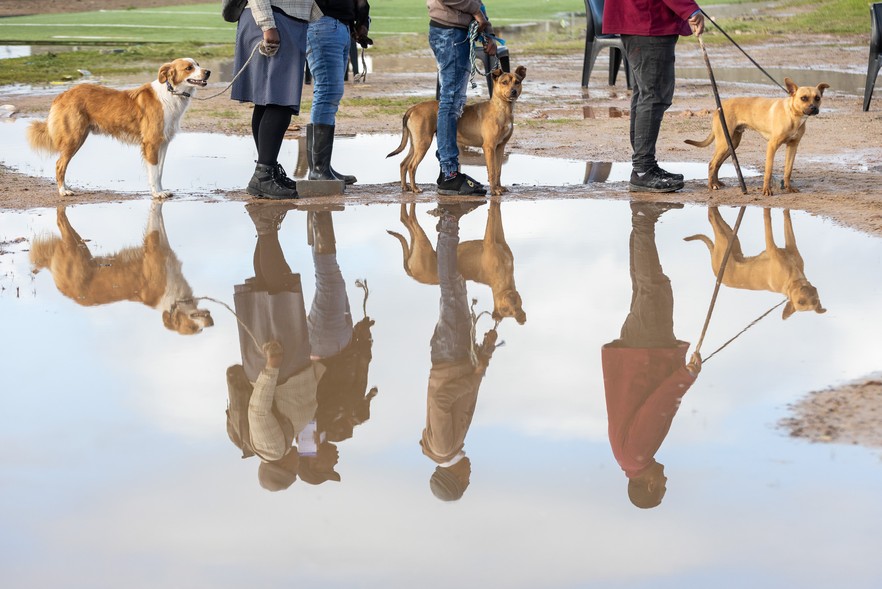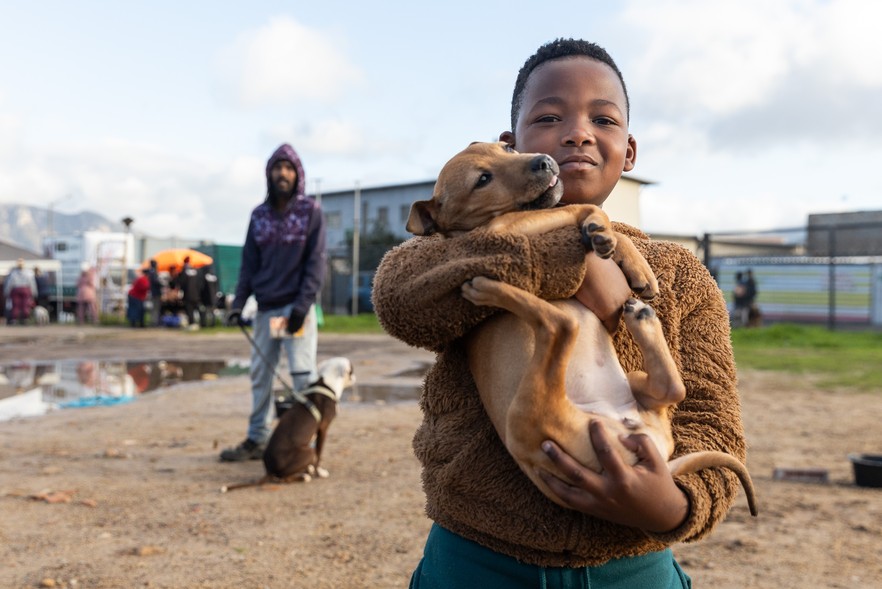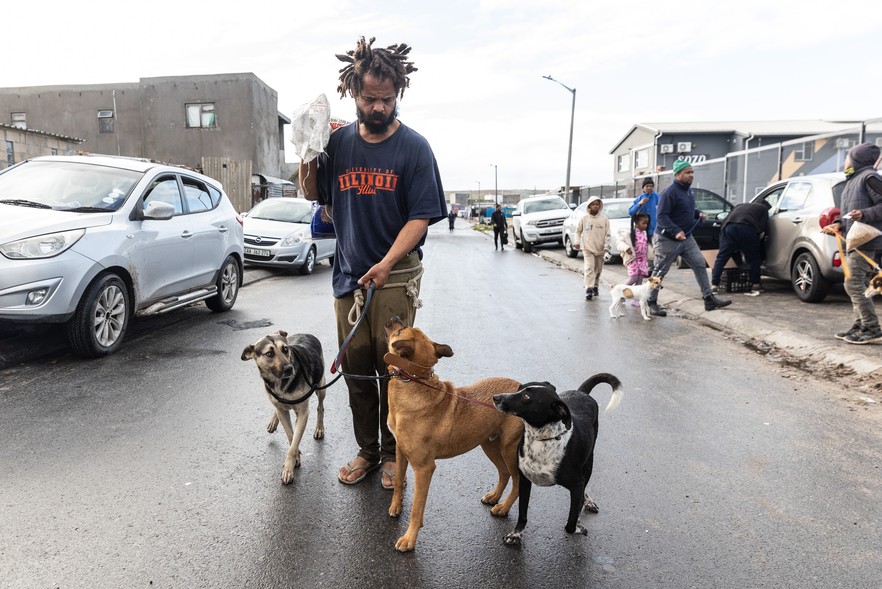Dogs and cats get their own taxi in Cape Town
The taxi is being piloted by AfriPaw and is aimed at providing access to its free monthly animal clinics for pets living in poor communities like Vrygrond
AfriPaw is piloting a pet taxi in Vrygrond in Cape Town to bring animals to the clinic they offer to residents once a month, free of charge. Photos: Ashraf Hendricks
A handful of four-legged companions from Vrygrond in Cape Town got to test out a new bicycle taxi for pets run by the organisation, AfriPaw. The aim of the initiative is to provide access to the animal clinics for pets living in under-resourced communities like Vrygrond.
“We noticed that people were unable to come to the clinic because their pets didn’t want to walk the distance,” says Anél Wesson, Director and Co-Founder of AfriPaw. Once a month the organisation brings a mobile clinic to the parking lot at Capricorn primary school where they offer vaccinations, sterilisations, and a number of other health checks.
Wesson says they found that some pet owners in the area were too old to walk to the mobile clinic. She says that after they saw a number of people bring their pets to the clinic in trolleys, they began to toy with the idea of starting a pet taxi.
Community members line-up with their pets to wait to be helped by volunteers at the animal clinic.
Wesson says they needed the “taxi” to be simple and cheap so it could easily be operated by people from their community. While this is still the testing phase of the project, she says they are looking into which bicycle works best to pull the weight of the animals. The cart was built and designed by 4Evr Plastic Products pro bono.
Wesson says that AfriPaw is now looking for a company to sponsor the project. The setup costs for one unit is R25,000 for the first year, thereafter it would cost about R7,000 a year. This includes the bicycle, cart, cage and the wages of the rider. “We are looking to have between five and ten taxis in the first year,” she says.
AfriPaw was founded in 2017 and runs a host of programmes including the free monthly clinic, mass sterilisations and educational workshops in Vrygrond. The clinics are run with other animal welfare organisations such as TEARS Animal Rescue, Animal Lifeline and Aid4Animals in Distress. The monthly clinics serve about 650 pets including cats and dogs from the broader community. The programmes are run with the help of volunteers and ‘ambassadors’ who live in the community that get paid a stipend.
Lizalise Qalekiso and his mother Bongeka brought their two-month-old puppy ‘Brown’ to the AfriPaw clinic to be washed and dewormed.
Vrygrond resident and volunteer Domaine Martin told GroundUp that pet owners in the community often struggled to get food for their companions. “Most people don’t have work, but they are trying to look after their dogs.”
“They provide a wonderful service for our animals”, says Capricorn resident Alessandro Jeftha, who brought his cat and three dogs to the clinic. He says that he is incredibly grateful for the free service.
Wesson added that the main purpose of the organisation is “to come alongside pet owners in informal settlements and under resourced areas to form relationships with them”.
She says that their ambassadors from the area educate and encourage pet owners to visit their monthly clinics. “It’s very much a community integrated effort,” she says. In the future she says that they would like to grow and replicate this model into other areas.
Capricorn resident Alessandro Jeftha brought his dogs, Jackson, Sharon and Olione to the clinic on Saturday.
Support independent journalism
Donate using Payfast

Don't miss out on the latest news
We respect your privacy, and promise we won't spam you.
Next: New app to help Western Cape social workers
Previous: Man found dead after arrest: family demands answers from police
Letters
© 2024 GroundUp. This article is licensed under a Creative Commons Attribution-NoDerivatives 4.0 International License.
You may republish this article, so long as you credit the authors and GroundUp, and do not change the text. Please include a link back to the original article.
We put an invisible pixel in the article so that we can count traffic to republishers. All analytics tools are solely on our servers. We do not give our logs to any third party. Logs are deleted after two weeks. We do not use any IP address identifying information except to count regional traffic. We are solely interested in counting hits, not tracking users. If you republish, please do not delete the invisible pixel.




